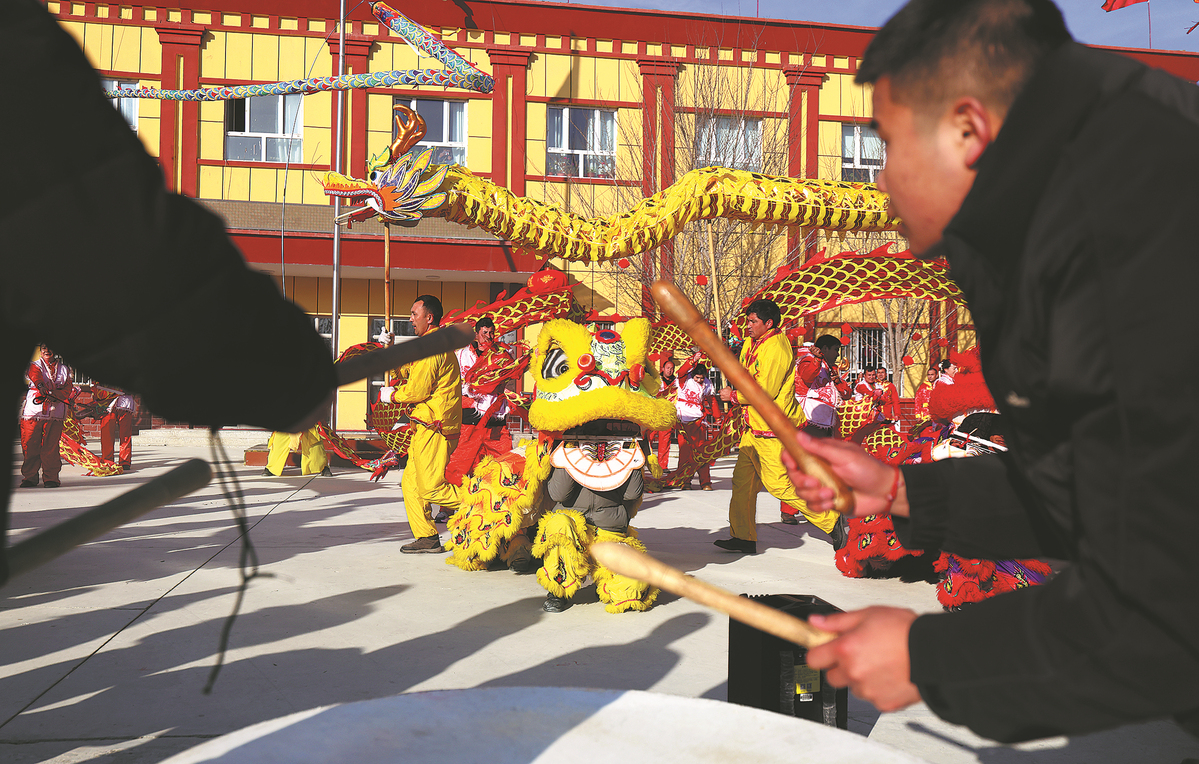
People participate in a dragon and lion dance in preparation for a Spring Festival village gala in Hongqi village, Aksu, Xinjiang Uygur autonomous region, on Jan 16. FENG YONGBIN/CHINA DAILY
The Hongqi village in the Xinjiang Uygur autonomous region has been known for its abundant crops of tart dried apricots, sugar beet, bitter astragalus root and spicy peppers.
Among its neighbors tucked at the foot of Tianshan Mountains in Aksu city's Baicheng county, the village is also the go-to place for a fusion of singing, dancing, acrobatic and opera performances infused with festive cheer around the Spring Festival holiday.
For the third year in a row, the village organized a local gala show — a grassroots version of the Spring Festival Gala produced and aired nationwide by China Central Television — ahead of this year's Chinese New Year that will fall on Jan 29.
"When we first staged the show in 2023, about 100 villagers joined in the activity. The number of participants doubled last year and reached 400 this year," said Yushan Turson, the village's Party secretary.
"Even locals from nearby villages were attracted here to perform or simply join the fun as spectators."
The village gala was initiated thanks to the fast development of rural collective economy, largely bolstered by the establishment of a village-level cooperative in 2020, according to Yushan.
The rural cooperative has consolidated land resources scattered among farmers and managed them as a whole to improve utilization and production efficiency.
As a result, local farmers no longer rely solely on plot cultivation to make a living.
They can now obtain dividends from shares in the rural collective and various bonuses. Some have opted to get a job at the cooperative or picked up gig jobs in urban areas to earn additional income.
"At this time of the year, many migrant workers have returned home and local villagers have plenty of free time," Yushan said. "As their income and livelihoods have significantly improved, they are willing to spend time and energy on entertainment activities like the gala show."
This year's one-hour village gala featured a lineup of operas, poetry recitations, songs and ethnic or regional dances.
Outside in the village square, a troupe of performers who wore or carried segments of dragons performed a folk performance believed to bring good luck and prosperity.
Li Hui, 29, returned from the Aksu city to his hometown in a nearby village around mid-December and had been practicing and preparing for the show since then.
"Precision is the key to the dragon dance. If my moves are not completely synced with other performers, the long dragon costume might get all tangled up," he said.
Li had never received any training in folk performance until he jumped on the opportunity to take part in the gala show three years ago.
"It was difficult at the beginning, but gradually, I enjoyed myself in learning, practicing and having fun with fellow villagers," he said.
Alimre Akim was the most impressed by a Peking Opera dance number during the gala.
"The elaborate costume and performers' expressions and moves were novel and seemed to carry a special hint of elegance in my eyes," said the 25-year-old.
"The gala provided an opportunity for different ethnic groups to learn about each other's culture."
Alimre graduated with a degree in biotechnology in 2023 and returned to the Hongqi village to work as a government employee.
"In the past, a household of three to four people had to dedicate all their time into tending to farmland. The establishment of the rural cooperative has relieved their burden while boosting income," she said.
"Having witnessed such changes, I was inspired and decided to come back here and help the village to achieve further prosperity."
wangxiaoyu@chinadaily.com.cn